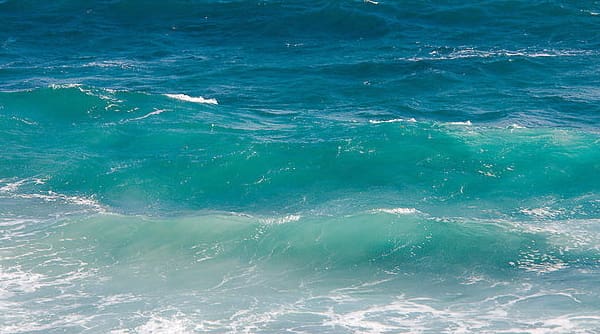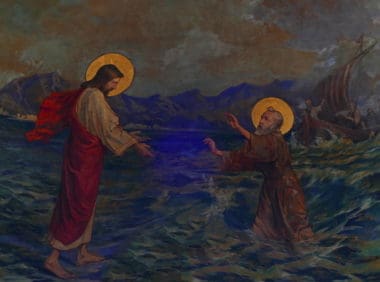Learning to Float in the Ocean of Mercy

[…Some time ago, a] young woman was eagerly learning the art of surrender to the Divine Instructor. Jesus revealed to St. Maria Faustina, an obscure Religious Sister in Poland, His deep love and mercy for all humanity and appointed her as His ‘Messenger of Mercy’. His message  involved a request for our childlike confidence in His love and a renewed call for mercy toward our neighbor. Because of our fallen nature, it is easy to emphasize one of these aspects over the other. In my experience, it is far less demanding to heed the call to serve and pray for one’s neighbors than it is to take seriously Jesus’ call to deep trust in one’s own relationship with Him. Trust in mercy must precede our efforts to serve others because we cannot give what we do not have.
involved a request for our childlike confidence in His love and a renewed call for mercy toward our neighbor. Because of our fallen nature, it is easy to emphasize one of these aspects over the other. In my experience, it is far less demanding to heed the call to serve and pray for one’s neighbors than it is to take seriously Jesus’ call to deep trust in one’s own relationship with Him. Trust in mercy must precede our efforts to serve others because we cannot give what we do not have.
Trusting, like learning to float, requires a genuine willingness to surrender. Since we are such fearful creatures, surrender is very often difficult for us. This is especially the case when we are asked to place our confidence in something or  someone who is mysterious and who we cannot see or control. Nevertheless, Jesus repeats over and over His desire that we increase our trust in Him. Just like a child in his father’s arms, trust is the greatest means that we have of showing our love.
someone who is mysterious and who we cannot see or control. Nevertheless, Jesus repeats over and over His desire that we increase our trust in Him. Just like a child in his father’s arms, trust is the greatest means that we have of showing our love.
We have been told since we were children that God loves us, and that He is good. Yet, somehow, this ‘head knowledge’ rarely makes a deep and lasting change in our hearts. So often in our brokenness, we return doubt for love and try to hedge our bets by clinging to mistrust even in the face of God’s overwhelming goodness. This disbelief, though, has repercussions not only in our own souls but also the Heart of God, as well. As Jesus told St. Faustina, “My heart is sorrowful, because…souls do not understand the greatness of My mercy. Their relationship [with Me] is, in certain ways, imbued with mistrust. Oh, how much that wounds My heart! Remember My Passion, and if you do not believe My words, at least believe My wounds.” (Diary – Divine Mercy in My Soul [identified henceforth simply as Diary] 379)
Why don’t we trust God fully? Original sin has left some deep scars on each of our souls. Even after Baptism, these wounds continue to breed doubt about God’s goodness and make it difficult for us to not defend ourselves in the face of vulnerability. Coupled with the effects of original sin, our unique personalities and temperaments increase or decrease our ability to trust. Add to that our personal history with all the ways we have inflicted harm on ourselves or felt the effects of others’ harmful choices, and in the end, many of us find that we have layers and layers which we have to work through in order to find the freedom we need to unconditionally surrender to God’s loving guidance. Yet, the good news is that God is not surprised or put off by our brokenness and our struggle to trust. In fact, it is into this very struggle to trust that He desires to come.
 God is love and, therefore, He can act only out of love. As St. Faustina explains, the key to growth in trust is deep knowledge of God’s goodness. She writes, “Some souls do not have the courage to entrust themselves completely to God. And this is so because few souls know the unfathomable mercy of God and His great goodness.” (Diary 731) St. Faustina is not speaking of ‘head knowledge’; this is heart-to-heart knowledge. The more we come to intimately know and love our Lord, the more we recognize His gentle voice speaking in our hearts; the more He reveals to us His goodness and mercy; the more we allow our gaze to meet His, the deeper our courage to surrender to Him will be.
God is love and, therefore, He can act only out of love. As St. Faustina explains, the key to growth in trust is deep knowledge of God’s goodness. She writes, “Some souls do not have the courage to entrust themselves completely to God. And this is so because few souls know the unfathomable mercy of God and His great goodness.” (Diary 731) St. Faustina is not speaking of ‘head knowledge’; this is heart-to-heart knowledge. The more we come to intimately know and love our Lord, the more we recognize His gentle voice speaking in our hearts; the more He reveals to us His goodness and mercy; the more we allow our gaze to meet His, the deeper our courage to surrender to Him will be.
Jesus reminded St. Faustina repeatedly that there is a direct correlation between our ability to trust and our capacity to receive His grace. Mistrust makes our relationship with Him very strained and tense. Tense souls sink. When we give God the freedom to act in our lives, we experience deep peace. Jesus tells St. Faustina that the battle for sanctity is won when we choose to trust in His help. He pleads, “How very much I desire the salvation of souls! I want to pour out my divine life into human souls and sanctify them, if only they were willing to accept My grace. The greatest sinners would achieve great sanctity, if only they would trust in my mercy.” (Diary 1784) The work of our sanctity is His to accomplish. We are to put forth our greatest efforts to grow in holiness by striving to grow in trust and love. Through the joys, sorrows, sufferings, and triumphs that He providentially ordains for our growth and healing, He can do His work in us without impediment.
Trust is the greatest expression of love. There can be no substitute – for love without trust is a farce. We are called to trust in God’s mercy even when our faith is tested by the experience of our weakness and sinfulness or by the trials and circumstances of life. As St. Faustina writes, “The soul gives the greatest glory to its Creator when it turns with trust to The Divine Mercy.” (Diary 930) From this reception of Mercy in our own lives, our mission to share this gift with others is born. Jesus promises, “When a soul approaches Me with trust, I fill it with such an abundance of graces that it cannot contain them within itself, but radiates them to other souls.” (Diary 1074) Thus, through prayers, words, and deeds of mercy, the soul can’t help but naturally radiate the great gift which has been poured into it…
 May we search out His gaze. May we learn to surrender in His arms. May we learn to trust our Father who desires nothing more than our confidence in His love.
May we search out His gaze. May we learn to surrender in His arms. May we learn to trust our Father who desires nothing more than our confidence in His love.
With unbounded trust comes unspeakable joy and unlimited possibilities.
Excerpted from a post which appeared on the website of the Carmelite Sisters of the Most Sacred Heart of Los Angeles. Used with permission.
+
Art for this post on “Learning to Float in the Ocean of Mercy”: Detail of Caribbean Waters, photographed by Šarunas Burdulis, 1 January 2012, CCA-SA 2.0 Generic; Saint Faustina, artist not identified, photograph dated 19 April 2007, PD-US author’s life plus 70 years or less; Modified detail of Jésus marchant sur les eaux (Jesus walking on water), Alsace, Bas-Rhin, Église Saint-Pierre de Bourg-Bruche, artist not identified, XIXe-XXe, photographed and copyright 28 September 2015 by Ralph Hamman – Wikimedia Commons, CCA-SA 4.0 International; Divine Mercy painting in Divine Mercy Sanctuary in Vilnius, Eugeniusz Kazimirowski, 1934, PD-US author’s life plus 70 years or less; all Wikimedia Commons.



